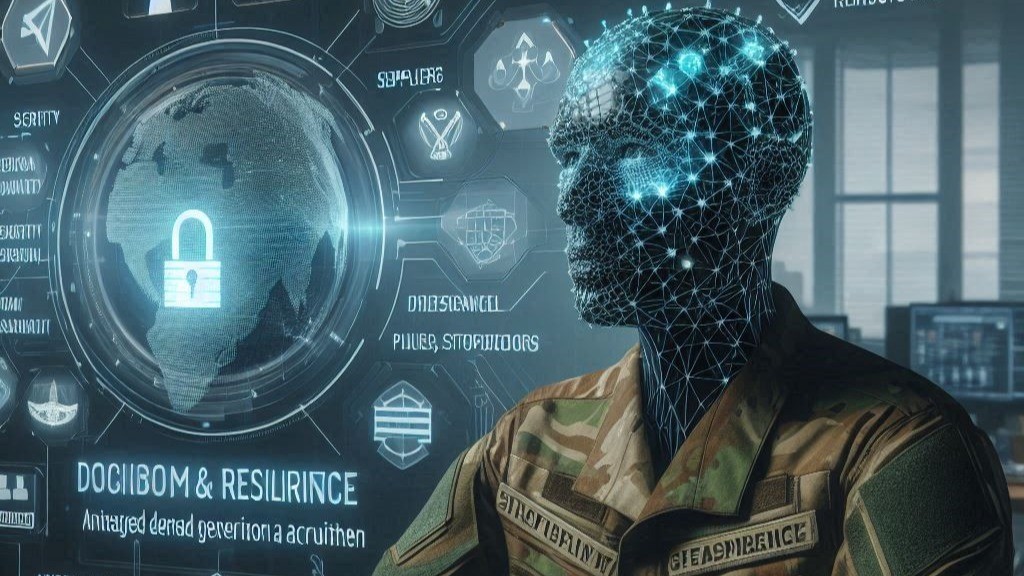In today’s technologically advanced era, the battle of AI vs cyberattacks in defense is becoming ever more critical. The integration of artificial intelligence (AI) in the domain of defense is reshaping how military and security forces tackle cyber threats. As cyberattacks grow in sophistication, utilizing AI for countermeasures becomes not just beneficial but essential. This article explores the dynamic interplay between AI and cyber defense strategies, providing insights into how AI is revolutionizing security measures globally.

Understanding the Threat Landscape
The digital battlefield is unlike any physical confrontation. Cyberattacks can strike from anywhere in the world, at any time. Hackers continuously evolve their tactics, deploying malware, ransomware, and phishing schemes that prove difficult to defend against using traditional methods. This ever-evolving threat landscape necessitates innovative solutions the next frontier in this battle is AI.
The Role of AI in Defense
AI brings to the table an ability to process vast amounts of data with unprecedented speed and accuracy. This capability is instrumental in identifying patterns and predicting cyberattacks before they occur. In defense, AI algorithms can provide early warning signs of potential threats, enabling quicker and more effective responses. The automation of these processes is critical in the face of high-volume cyber threats.
AI-Driven Cyberattack Predictions
With machine learning at its core, AI systems learn from past data to predict new threats. This predictive capability becomes crucial for preemptive action, thereby significantly reducing the time and resources spent responding to cyber incidents.
Related read on predictive capabilities: Responsible AI in Defense.
Integration of AI with Current Defense Systems
The seamless integration of AI with existing defense systems enhances operational efficiency. Coupled with traditional defense mechanisms, AI bolsters their resilience against cyber threats, effectively transforming defense strategies into a proactive rather than reactive approach.
AI Enhancing Cybersecurity Measures
Aside from predictive capabilities, AI aids in strengthening cybersecurity through continuous monitoring and instant response to suspicious activities. AI systems can autonomously implement security protocols, addressing vulnerabilities without human intervention.
AI vs Ransomware Attacks
Among various cyber threats, ransomware poses a significant challenge. The ability of AI to detect and neutralize ransomware components before they execute is a considerable advantage in the defense sector, ensuring vital defense infrastructure remains unscathed.
Real-Time Threat Detection
With rapid advancements in AI technology, real-time threat detection has become a reality. AI systems can identify anomalies and mitigate them in real time, which is crucial in preventing potential data breaches and maintaining the integrity of defense networks.
The Future of AI in Cyber Defense
The future promises even more sophisticated applications of AI in cyber defense. As AI continues to evolve, the potential to revolutionize military strategies grows exponentially. This technological leap not only improves defense capabilities but also shapes a more secure world landscape.
AI-Integrated Autonomous Systems
Autonomous systems powered by AI are emerging as game-changers in modern warfare. These systems can undertake missions and respond to threats independently, reducing human error and enhancing operational success rates.
Learn more about AI autonomy: AI Safety in Systems.
Challenges and Considerations
Despite its potential, the deployment of AI in defense is not without challenges. Ethical considerations, potential biases in AI algorithms, and the threat of adversarial AI require ongoing scrutiny and policy development to ensure responsible application.
AI and Cyber Warfare: A Strategic Alliance
AI’s growing role in cyber warfare demonstrates a strategic alliance that nations around the world are adapting to. It allows for rapid decision-making and efficient resource allocation, attributes that are vastly advantageous in high-stakes defense situations.
Explore this topic further: AI in Cyber Warfare.
Strengthened Defense Collaboration
Moreover, AI facilitates enhanced collaboration among nations in terms of joint defense initiatives, sharing critical intelligence, and co-developing cyber defense systems. This cooperation is essential for countering sophisticated global cyber threats effectively.
Harnessing AI’s Full Potential
For AI to fully realize its potential in defense, ongoing research, investment, and policy-making are crucial. Bridging the gap between technology and its application in defense strategies will usher in a new era of cyber resilience.
Dive deeper into AI’s role: AI Model Training.
Conclusion
The battle of AI vs cyberattacks in defense is not just a technological advancement but a strategic necessity. As AI continues to evolve, its integration into defense strategies will undoubtedly transform cyber warfare dynamics, making the world a safer place. By leveraging AI’s capabilities, defense systems can stay one step ahead of cyber threats, securing critical infrastructure and maintaining global peace.

FAQs
- How does AI improve cybersecurity in defense?
AI enhances cybersecurity by predicting threats, monitoring systems continuously, and responding to suspicious activities with speed and precision. - What challenges does AI face in defense applications?
Challenges include ethical concerns, potential biases, and the risk of adversarial attacks on AI algorithms. - Can AI operate autonomously in defense systems?
Yes, AI can power autonomous systems that execute missions and respond to threats with minimal human intervention, reducing risks and errors.

